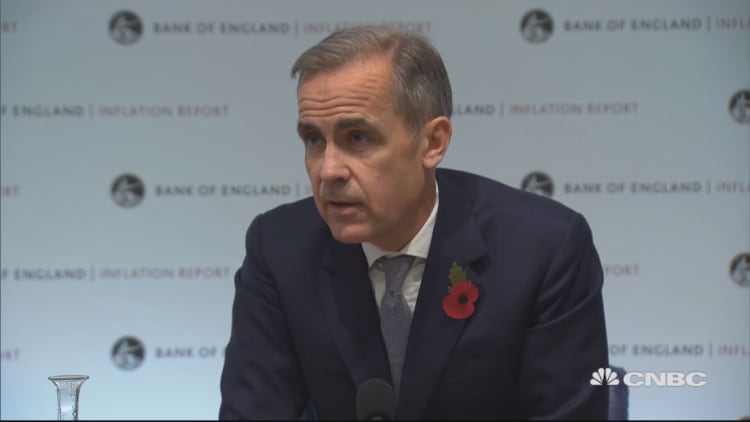
The Bank of England kept its benchmark interest rates unchanged on Thursday, and hinted that a smooth Brexit could quicken the bank's rate-hiking cycle.
The BOE rate-setters voted unanimously to hold rates at 0.75 percent. In August this year, the bank raised interest rates by 25 basis points — its second time since the financial crisis.
Despite good economic data, the lack of certainty over Brexit seemed to have hit business sentiment and could bring further volatility, the bank said in a statement.
The BOE has so far acted on the basis that the EU and the U.K. will strike an agreement over Brexit.
"Were the economy to continue to develop broadly in line with the November Inflation Report projections, an ongoing tightening of monetary policy over the forecast period would be appropriate," Mark Carney, governor of the Bank of England told reporters, hinting that if a Brexit deal is achieved there could be further increases to rates.
He told CNBC's Joumanna Bercetche during the Q&A session that the market rate expectations curve leaves inflation a bit above target in year two — meaning that in the event of a Brexit agreement, there could be reasons to push rates higher than currently expected.
Carney also said that Thursday's decision and forecasts did not include the government's new budget plan. The U.K.'s finance minister Philip Hammond announced last Monday some stimulus measures. These could also prompt the BOE to raise rates.

However, the central bank highlighted nonetheless that everything is still up in the air, as Brexit negotiators have not yet concluded their talks and a lot will depend on how the negotiations pan out.
"The economic outlook will depend significantly on the nature of EU withdrawal, in particular the form of new trading arrangements, the smoothness of the transition to them and the responses of households, businesses and financial markets," the BOE said in a statement.
However, it also cautioned that depending on how the process to leave the EU unfolds, there could be changes to rates either way.
"The monetary policy response to Brexit, whatever form it takes, will not be automatic and could be in either direction," the BOE said in a statement.

Carney told reporters that "there are scenarios where policy would need to be tightened in the event of a no-deal no-transition, so-called disorderly Brexit, but I would stress that is not the view of the committee that is the most likely scenario."
Inflation and growth forecasts
The central bank also published new economic forecasts and revised down its growth and inflation forecasts slightly lower for next year. GDP is now expected to hit 1.7 percent in 2019 from an earlier forecast of 1.8 percent in August.
In terms of inflation, the bank revised its estimates lower to 2.1 percent next year from 2.2 percent in August. However, on the back of higher oil prices, inflation was revised upwards for this year and 2021 to 2.5 percent and 2.1 percent, respectively.
Sterling jumped against the dollar on Thursday. Prior to the announcement, sterling stood at $1.28, after reports suggested that both the EU and the U.K. reached an agreement on financial services. Sterling rallied even further after the BOE's announcement to trade around $1.29 shortly after the decision was released.
Derek Halpenny, European head of global markets research at MUFG, told CNBC that there is "more compelling evidence that wages are picking up."
"If you look at sector by sector, there's some real telling stories there in relation to potential supply problems related to Brexit, coming through in construction, in hotel, restaurants for example we had some pretty strong wage growth there," he said.


